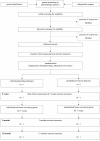Effectiveness of individualized physiotherapy on pain and functioning compared to a standard exercise protocol in patients presenting with clinical signs of subacromial impingement syndrome. A randomized controlled trial
- PMID: 20534140
- PMCID: PMC2889850
- DOI: 10.1186/1471-2474-11-114
Effectiveness of individualized physiotherapy on pain and functioning compared to a standard exercise protocol in patients presenting with clinical signs of subacromial impingement syndrome. A randomized controlled trial
Abstract
Background: Shoulder impingement syndrome is a common musculoskeletal complaint leading to significant reduction of health and disability. Physiotherapy is often the first choice of treatment although its effectiveness is still under debate. Systematic reviews in this field highlight the need for more high quality trials to investigate the effectiveness of physiotherapy interventions in patients with subacromial impingement syndrome.
Methods/design: This randomized controlled trial will investigate the effectiveness of individualized physiotherapy in patients presenting with clinical signs and symptoms of subacromial impingement, involving 90 participants aged 18-75. Participants are recruited from outpatient physiotherapy clinics, general practitioners, and orthopaedic surgeons in Germany. Eligible participants will be randomly allocated to either individualized physiotherapy or to a standard exercise protocol using central randomization. The control group will perform the standard exercise protocol aiming to restore muscular deficits in strength, mobility, and coordination of the rotator cuff and the shoulder girdle muscles to unload the subacromial space during active movements. Participants of the intervention group will perform the standard exercise protocol as a home program, and will additionally be treated with individualized physiotherapy based on clinical examination results, and guided by a decision tree. After the intervention phase both groups will continue their home program for another 7 weeks. Outcome will be measured at 5 weeks and at 3 and 12 months after inclusion using the shoulder pain and disability index and patients' global impression of change, the generic patient-specific scale, the average weekly pain score, and patient satisfaction with treatment. Additionally, the fear avoidance beliefs questionnaire, the pain catastrophizing scale, and patients' expectancies of treatment effect are assessed. Participants' adherence to the protocol, use of additional treatments for the shoulder, direct and indirect costs, and sick leave due to shoulder complaints will be recorded in a shoulder log-book.
Discussion: To our knowledge this is the first trial comparing individualized physiotherapy based on a defined decision making process to a standardized exercise protocol. Using high-quality methodologies, this trial will add evidence to the limited body of knowledge about the effect of physiotherapy in patients with SIS.
Similar articles
-
Treatment of myofascial trigger points in common shoulder disorders by physical therapy: a randomized controlled trial [ISRCTN75722066].BMC Musculoskelet Disord. 2007 Nov 5;8:107. doi: 10.1186/1471-2474-8-107. BMC Musculoskelet Disord. 2007. PMID: 17983467 Free PMC article. Clinical Trial.
-
The Strengthening Exercises in Shoulder Impingement trial (The SExSI-trial) investigating the effectiveness of a simple add-on shoulder strengthening exercise programme in patients with long-lasting subacromial impingement syndrome: Study protocol for a pragmatic, assessor blinded, parallel-group, randomised, controlled trial.Trials. 2018 Mar 2;19(1):154. doi: 10.1186/s13063-018-2509-7. Trials. 2018. PMID: 29499710 Free PMC article.
-
Finnish Subacromial Impingement Arthroscopy Controlled Trial (FIMPACT): a protocol for a randomised trial comparing arthroscopic subacromial decompression and diagnostic arthroscopy (placebo control), with an exercise therapy control, in the treatment of shoulder impingement syndrome.BMJ Open. 2017 Jun 6;7(5):e014087. doi: 10.1136/bmjopen-2016-014087. BMJ Open. 2017. PMID: 28588109 Free PMC article. Clinical Trial.
-
Effect of supervised physiotherapy versus home exercise program in patients with subacromial impingement syndrome: A systematic review and meta-analysis.Phys Ther Sport. 2020 Jan;41:34-42. doi: 10.1016/j.ptsp.2019.11.003. Epub 2019 Nov 6. Phys Ther Sport. 2020. PMID: 31726386
-
The management of shoulder impingement and related disorders: A systematic review on diagnostic accuracy of physical tests and manual therapy efficacy.J Bodyw Mov Ther. 2019 Jul;23(3):604-618. doi: 10.1016/j.jbmt.2018.08.002. Epub 2018 Oct 25. J Bodyw Mov Ther. 2019. PMID: 31563378
Cited by
-
Taping patients with clinical signs of subacromial impingement syndrome: the design of a randomized controlled trial.BMC Musculoskelet Disord. 2011 Aug 17;12:188. doi: 10.1186/1471-2474-12-188. BMC Musculoskelet Disord. 2011. PMID: 21849055 Free PMC article. Clinical Trial.
-
An Experimental and Clinical Physiological Signal Dataset for Automated Pain Recognition.Sci Data. 2024 Sep 27;11(1):1051. doi: 10.1038/s41597-024-03878-w. Sci Data. 2024. PMID: 39333541 Free PMC article.
-
Glenohumeral and scapulothoracic strength impairments exists in patients with subacromial impingement, but these are not reflected in the shoulder pain and disability index.BMC Musculoskelet Disord. 2017 Jul 17;18(1):302. doi: 10.1186/s12891-017-1667-1. BMC Musculoskelet Disord. 2017. PMID: 28716019 Free PMC article.
-
Structured Wii protocol for rehabilitation of shoulder impingement syndrome: A pilot study.Ann Phys Rehabil Med. 2017 Nov;60(6):363-370. doi: 10.1016/j.rehab.2016.10.004. Epub 2017 Mar 15. Ann Phys Rehabil Med. 2017. PMID: 28330586 Free PMC article. Clinical Trial.
-
Auricular acupuncture for prehypertension and stage 1 hypertension: study protocol for a pilot multicentre randomised controlled trial.Trials. 2013 Sep 22;14:303. doi: 10.1186/1745-6215-14-303. Trials. 2013. PMID: 24053577 Free PMC article. Clinical Trial.
References
-
- Luime JJ. Proefschrift. Erasmus Universiteit; 2004. Shoulder complaints: the occurrence, course and diagnosis.
-
- van der Heijden GJ. Shoulder disorders: a state of the art review. Baillieres Clinical Rheumatology. 1999;13:287–309. - PubMed
Publication types
MeSH terms
Associated data
LinkOut - more resources
Full Text Sources
Medical


